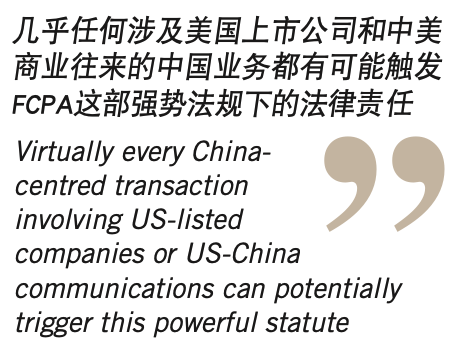The US Foreign Corrupt Practices Act is a powerful statute which governs many US-China transactions and communications. Its implications for Chinese, US and other companies are far-reaching, and the penalties for its violation severe. By Li Li and Steven Michaels, Debevoise & Plimpton
Sixty years after founding of the People’s Republic of China in 1949 and 30 years after normalization of diplomatic relations between the US and the PRC in 1979, the economies of the two nations – the first and third largest in the world – are intertwined more than ever. The US and the PRC are bound by hundreds of billions of dollars in annual trade and substantial cross-border investments, while at the same time there is increasing competition between Chinese and US companies for business on every continent.
A key component of the legal architecture underlying these commercial activities is the US Foreign Corrupt Practices Act (FCPA). The FCPA is a 1977 statute with broad international application. It governs in numerous and often-unanticipated ways interactions by companies and individuals alike with non-US officials, employees of State-owned enterprises, non-US political parties, party employees and candidates, as well as employees of nearly 100 international organizations, including the United Nations and its entities, the International Red Cross, the World Bank, and the Asian, African, and Inter-American Development Banks. In fact, due to the role of the State in the Chinese economy, virtually every China-centred transaction involving US-listed companies or US-China communications can potentially trigger this powerful statute.

You must be a
subscribersubscribersubscribersubscriber
to read this content, please
subscribesubscribesubscribesubscribe
today.
For group subscribers, please click here to access.
Interested in group subscription? Please contact us.
你需要登录去解锁本文内容。欢迎注册账号。如果想阅读月刊所有文章,欢迎成为我们的订阅会员成为我们的订阅会员。
Li Li is managing partner at Debevoise & Plimpton LLP in Shanghai and is qualified to practise PRC law. She practises primarily in the area of corporate transactions and corporate governance.
Steven Michaels is a counsel in the firm’s New York office and is a member of the litigation department and compliance and internal investigations group. He has advised dozens of multinational corporations in connection with the firm’s FCPA compliance practice.





















